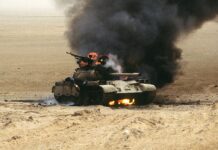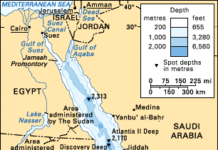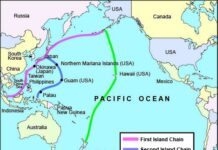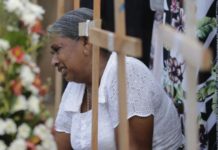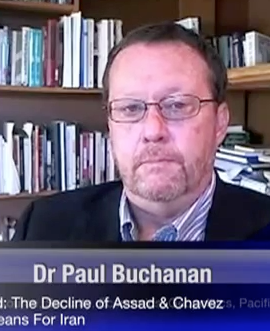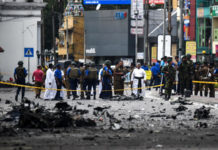Pacific Scoop PIF Coverage
Selling sovereignty, declining responsibility – Pacific flags of convenienceRua
http://pacific.scoop.co.nz/2012/08/selling-sovereignty-and-declining-responsibility-flags-of-convenience-in-pacific/

The Marshall Islands-registered chemical tanker ECE, northwest of the Channel Island of Guernsey, on January 31, 2006. Helicopters and life boats rescued 22 sailors after two ships collided in the English Channel. Image: Shipwreck.eu
Pacific Scoop:
Analysis – By Dr Paul G. Buchanan of 36th Parallel
One of the solutions to the problem of revenue generation in resource-poor states such as the small island countries of the South Pacific is found in the sale of tokens of sovereignty.
Tokens of sovereignty are commodities derived from a state’s international legal status as a geographically and politically distinct, and hence sovereign entity.
Unlike symbols of sovereignty such as national flags, tokens of sovereignty can only be sold, bartered or exchanged by nation-states.
 Be it postage stamps, internet domain addresses or passports, tokens of sovereignty command real value in both legitimate and black markets.
Be it postage stamps, internet domain addresses or passports, tokens of sovereignty command real value in both legitimate and black markets.
As the 43rd Pacific Islands Forum takes place in the Cook Islands this week, 36th Parallel [full article here] this week looks at the increasing use in the South Pacific of one such token: flags of convenience (FOCs).
It may come as a surprise to some that the BP Deepwater Horizon petroleum derrick in the Gulf of Mexico was classified as a vessel under international maritime law.
Such platforms are classified as SOLAS (from the 1974 Convention on Safety of Life At Sea) vessels, in this case a non-passenger vessel of 500 tonnes or more engaged in an international voyage.
There are currently 800 SOLAS vessels in operation. These vessels make nearly 6000 ports visits annually.
Floating barges
In essence, under the SOLAS Convention and for the purposes of maritime law, the BP Deepwater Horizon and its ilk are considered to be floating barges that are towed to the exploration site and anchored before well drilling commences (the derrick is mostly assembled after anchoring).
For a vessel to operate in a commercial capacity it needs to be registered by a state, which determines the conditions and regulations governing the operation of said vessel.
The BP Deepwater Horizon was registered in the Marshall Islands, a country consisting of two archipelagic island chains populated by 70,000 inhabitants that since 1986 is in a Free Compact Association with the United States.
The Marshal Islands are where the Bikini and Enewetak nuclear tests were conducted and is home to the US missile tracking station on the Kwajalein atoll.
…
Marshall Islands fleet
The Marshall Islands has more than 1500 vessels registered to its flag, making it the seventh largest merchant fleet in the world. Of these, more than 1400 are foreign-owned.
In an interesting arrangement with the US (from which it receives direct foreign aid amounting to 70 percent of GDP), all vessels flagged in the Marshall Islands can be requisitioned by the US in times of war (in exchange for US defense guarantee).
At less than 100 vessels, the US merchant marine fleet is dwarfed by that of the Marshall Islands, so the arrangement is prudent if not practical.
However, since US companies have 200 vessels registered under the Marshall Islands flag, it also demonstrates that patriotism is not a factor when it comes to commercial considerations with regard to flagging.
The reality is that the US subsidises a country that is in part responsible for the decline of the US merchant marine industry.
…
Other Pacific flags
The Marshall Islands is not the only Pacific Island Forum member to be classified as a Flag of Convenience (FOC) state.
The Cooks Islands, Kiribati, Tuvalu and Vanuatu offer FOCs. Vanuatu has 77 ships in its fleet, of which 72 are foreign owned (39 by Japan). Tuvalu has 80 ships, of which 63 are foreign owned (Tuvalu has just de-registered under US pressure 22 Iranian oil tankers that were re-flagged in order to avoid international sanctions; it also has a past history of flagging North Korean vessels involved in arms and drug smuggling).
Kiribati has 43 flagged vessels, 31 of them foreign owned. The Cook Islands has more than 50 FOC vessels.
Tonga maintained an FOC fleet until 2002, when it halted its FOC registry after one of its flagged ships was found to be smuggling weapons from North Korea.
© 2012 Dr Paul G. Buchanan is a principal of 36th Parallel Strategic Assessments Ltd. This article excerpt is published by arrangement with the Pacific Media Centre, not to be republished.
Full article:
Risk Assessment: Selling sovereignty and declining responsibility. Flags of Convenience in the South Pacific
Unless expressly stated otherwise, the findings, interpretations and conclusions expressed in this media release item do not necessarily represent the views of 36th Parallel Assessments.


